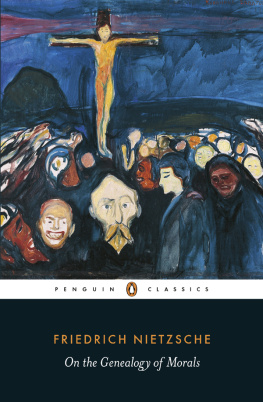On the
Genealogy of
Morality
Appended to the recently published Beyond Good and Evil as a supplement and clarification.
FRIEDRICH
NIETZSCHE
On the
Genealogy of
Morality
A Polemic
Translated, with Notes, by
Maudemarie Clark and Alan J. Swensen
Introduction by Maudemarie Clark
Hackett Publishing Company, Inc.
Indianapolis/Cambridge
Friedrich Nietzsche: 18441900
Copyright 1998 by Hackett Publishing Company, Inc.
Cover design by Brian Rak and John Pershing
Text design by Meera Dash
All rights reserved
Printed in the United States of America
12 11 10 09 08 4 5 6 7 8 9
For further information, please address
Hackett Publishing Company, Inc.
P. O. Box 44937
Indianapolis, Indiana 462440937
www.hackettpublishing.com
Library of Congress Cataloging-in-Publication Data
Nietzsche, Friedrich Wilhelm, 18441900.
[Zur Genealogie der Moral. English]
On the genealogy of morality/Friedrich Nietzsche; translation and notes by Maudemarie Clark and Alan Swensen; introduction by Maudemarie Clark.
p. cm.
Includes bibliographical references and index.
ISBN 0-87220-284-4 (cloth).
ISBN 0-87220-283-6 (pbk.).
1. Ethics. I. Clark, Maudemarie. II. Swensen, Alan J.
III. Title.
B3313.Z73E5 1998
ISBN-13: 978-0-87220-284-9(cloth).
ISBN-13: 978-0-87220-283-2(pbk).
ePub ISBN: 978-1-60384-588-5
Contents
1. Nietzsches Path to the End of the Twentieth Century
When Nietzsches Genealogy was published in 1887, there was little reason to think it would become an important book, much less a recognized masterpiece. Indeed, its prospects for success could hardly have looked much worse. Great things had certainly been expected of its author. Born in 1844 on the birthday of King Friedrich Wilhelm IV of Prussia, after whom he was named, Nietzsche survived major trauma in his early childhood: the death of his beloved father when he was not yet five, followed by the death of his younger brother the next year. A precocious student, he was awarded admission to the famed Pforta, from which he graduated in 1864 with a thesis in Latin on the Greek poet Theognis. He began university studies at Bonn, where he registered as a theology student, in accord with family expectations that he would follow in his fathers footsteps (which were also those of both grandfathers) and enter the ministry. Instead, he transferred to Leipzig, where he studied philology, becoming the protg of the well-known classical philologist, Friedrich Ritschl. With Ritschls strong endorsement, Nietzsche was appointed to the chair of classical philology at the University of Basel in 1869 at the unprecedented age of twenty-four and was made a full professor the following year. The scholarly world eagerly awaited his first book, expecting it to secure his reputation as a brilliant young scholar.
Serious health problems, undoubtedly exacerbated by his increasing feeling of being unsuited to the life of academic scholarship, forced him to resign his chair in 1879, allowing him to escape and begin life anew as a writer of philosophy. The first five books he published in this new role, howeverHuman, All Too Human; Daybreak; The Gay Science; Thus Spoke Zarathustra; and Beyond Good and Evilsold so few copies that no publisher would touch his Genealogy. It was printed by what we would now call a vanity press; Nietzsche himself had to pay the complete cost of its publication. In the hope of finding readers, he also spent a considerable amount of his own money publishing new editions of ents about the Germans make clear. He was increasingly appalled by the political atmosphere (especially the nationalism and anti-Semitism) he saw developing in Germany following the Franco-Prussian War and the establishment of the second Reich (1871), with Bismarck, who had engineered both, in almost complete control. Although he made visits there, Nietzsche did not choose to live in Germany after he left Basel, but spent the greater part of the life left to him in voluntary exile, traveling and living alone in pensions in various other European countries, always in search of conditions that would improve his deteriorating health and facilitate his work.
But Nietzsches prospects were actually much worse than they would have seemed to a contemporary observer. When his Genealogy appeared in November of 1887, he was little more than a year away from a complete mental and physical breakdown, which would overtake him in Turin, on January 3, 1889, bringing his productive life to an end. Before his collapse, he was ableincredibly enoughto write five new books: The Case of Wagner, Twilight of the Idols, The Anti-Christ(ian), Ecce Homo, and Nietzsche Contra Wagner. But his breakdown would eventually leave both his body and his spirit, as it was now embodied in his literary estate, under the control of his unphilosophical and unscrupulous sister, Elisabeth Frster-Nietzsche. It is almost universally agreed that she had no aptitude for philosophy, no understanding of her brothers philosophy, and a set of values quite antithetical to Nietzsches own. He was an atheist who was disgusted by anti-Semitism; she was a devout Christian who married a leading anti-Semite, Bernhard Frster (whom Nietzsche detested), who was hard at work founding a colony in Paraguay for Aryans, Nueva Germania. Elisabeth joined her husband in Paraguay for a time and, when he committed suicide (a few months after Nietzsches breakdown), she took over the affairs of the colony. But she soon returned to Germany, where she fought for and won complete control of Nietzsches unpublished work, including the letters he had sent to others. She began preparing a biography of Nietzsche, helped found the Nietzsche Archive to edit and publish his literary estate and to promote his philosophy, and was ready to assume physical custody of him when their mother, with whom Nietzsche had been living, died in 1897. Elisabeth moved Nietzsche to Weimar, the symbol of Germanys highest cultural achievements and the city to which she had already moved the Nietzsche Archive. He died in Weimar on August 25, 1900.
Worse, perhaps, she subjected her brother to what he would have considered the ultimate indignity, often having the half-paralyzed and insane Nietzschedressed in ways that encouraged perceiving him as a kind of holy apparitionappear on the balcony of his residence to groups that gathered below in anticipation of such appearances. When death finally granted him escape, he was eulogized by one of his most steadfast faithful friends, Peter Gast, with stress on the line, Holy be thy name to all coming generations.
In fact, Nietzsches name managed to escape this fate, because a much worse fate awaited it: Elisabeth, outliving her brother by several decades, helped link his name to the great horrors of the twentieth century: nationalism, anti-Semitism, and fascism. First she established ties to both the Nazis and the Italian fascists. Her correspondence with Mussolini and a photo of her with Hitler, who came to Weimar especially for one of her birthday celebrations, can now be seen on display at what was Nietzsches residence in Weimar. Further, the same display shows that in her appeals for official funds to promote the work of the Nietzsche Archive, Elisabeth had no qualms about presenting her brothers philosophy as offering support for Nazi aspirations. She told Hitler that he was exactly what her brother meant by the bermensch (the overhuman, one who transcends the merely human). It was hardly surprising, therefore, that Nazi theoreticians read Nietzsche and tried to use him in support of their own program.
Next page














